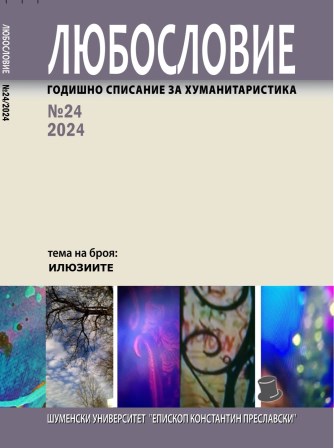Teaching Bulgarian Folktales in The EFL Classroom: Exploring ‘Storytelling in Education’, Textual Realms of Aesthetic Illusion and Your Own Local Folkloric Culture
Teaching Bulgarian Folktales in The EFL Classroom: Exploring ‘Storytelling in Education’, Textual Realms of Aesthetic Illusion and Your Own Local Folkloric Culture
Author(s): Bill TemplerSubject(s): Language and Literature Studies, Applied Linguistics, Language acquisition
Published by: Шуменски университет »Епископ Константин Преславски«
Keywords: aesthetic illusion; transmedia storytelling; storytelling in education; Bulgarian folktale; folklore studies
Summary/Abstract: Younger learners (and older ones too) enjoy folktales, fairy tales of all kinds, and all EFL teachers know that. Textbook writers too, including versions of familiar ‘children’s stories’ from the international or English repertoire. But how many teachers here in Bulgaria use English versions of Bulgarian traditional tales in their teaching—stories that all the teachers and a portion of the younger (and older) learners probably know in original Bulgarian versions through the numerous books of Ran Bossilek and Angel Karalyichev? It can become a revealing window onto your own culture through its translation into English. Using indigenous traditional tales: toward a ‘Bulgarian Applied ELT’. In ‘indigenizing the EFL syllabus,’ making it closer in feeling, content and imagination to the life worlds of Bulgarian learners, Bulgarian folktales in English translation have a key role to play. In this context, the article discusses at some length the concept of ‘aesthetic illusion’ as developed by Austrian literary scholar Werner Wolf and others. Folk literature is a major genre of textual fictional/imaginative representation grounded on ‘aesthetic illusioning’, an important focus in narratology. I would argue that indigenizing materials in Bulgaria, integral to a ‘Bulgarian TEFL,’ needs to take this parameter into clear account, within a framework of a ‘Bulgarian Applied ELT’ sensitive to local realities. The article also foregrounds secondarily the online upsurge in ‘storytelling in education’ over the past decade digitally and in the classroom and the use of picturebooks in building student literacy in Bulgarian and in foreign languages, The article likewise in sec. 19 probes in depth the current need for critical pedagogy contemplating the violence-permeated $y$tem and its narrative matrix we are encaged within.
Journal: Любословие
- Issue Year: 2024
- Issue No: 24
- Page Range: 207-241
- Page Count: 35
- Language: English

